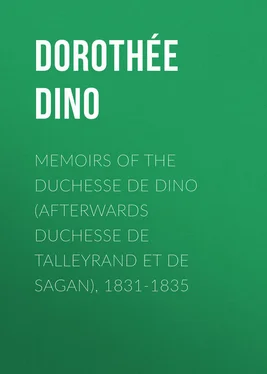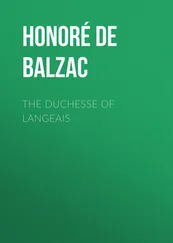Dino Dorothée - Memoirs of the Duchesse de Dino (Afterwards Duchesse de Talleyrand et de Sagan), 1831-1835
Здесь есть возможность читать онлайн «Dino Dorothée - Memoirs of the Duchesse de Dino (Afterwards Duchesse de Talleyrand et de Sagan), 1831-1835» — ознакомительный отрывок электронной книги совершенно бесплатно, а после прочтения отрывка купить полную версию. В некоторых случаях можно слушать аудио, скачать через торрент в формате fb2 и присутствует краткое содержание. Жанр: foreign_antique, foreign_prose, на английском языке. Описание произведения, (предисловие) а так же отзывы посетителей доступны на портале библиотеки ЛибКат.
- Название:Memoirs of the Duchesse de Dino (Afterwards Duchesse de Talleyrand et de Sagan), 1831-1835
- Автор:
- Жанр:
- Год:неизвестен
- ISBN:нет данных
- Рейтинг книги:4 / 5. Голосов: 1
-
Избранное:Добавить в избранное
- Отзывы:
-
Ваша оценка:
- 80
- 1
- 2
- 3
- 4
- 5
Memoirs of the Duchesse de Dino (Afterwards Duchesse de Talleyrand et de Sagan), 1831-1835: краткое содержание, описание и аннотация
Предлагаем к чтению аннотацию, описание, краткое содержание или предисловие (зависит от того, что написал сам автор книги «Memoirs of the Duchesse de Dino (Afterwards Duchesse de Talleyrand et de Sagan), 1831-1835»). Если вы не нашли необходимую информацию о книге — напишите в комментариях, мы постараемся отыскать её.
Memoirs of the Duchesse de Dino (Afterwards Duchesse de Talleyrand et de Sagan), 1831-1835 — читать онлайн ознакомительный отрывок
Ниже представлен текст книги, разбитый по страницам. Система сохранения места последней прочитанной страницы, позволяет с удобством читать онлайн бесплатно книгу «Memoirs of the Duchesse de Dino (Afterwards Duchesse de Talleyrand et de Sagan), 1831-1835», без необходимости каждый раз заново искать на чём Вы остановились. Поставьте закладку, и сможете в любой момент перейти на страницу, на которой закончили чтение.
Интервал:
Закладка:
Yesterday, at seven o'clock in the evening, I received an interesting note from a confidential friend of the Prime Minister: "Nothing has changed since yesterday, and there is no improvement in the situation. We shall spend to-night in trying to keep the question open, that is to say, to keep it from being regarded as a Cabinet question, and to leave everyone free to vote as he likes. The Lord Chancellor is trying hard to secure the adoption of this expedient, but Lord Grey, who is evidently anxious to resign, may very likely wreck the plan."
London, May 27, 1834. – After much agitation and uncertainty Lord Grey has decided to let Mr. Stanley and Sir James Graham leave the Ministry; their example will probably be followed by the Duke of Richmond and Lord Ripon. Lord Grey remains, taking the side of Mr. Ward's motion. For a moment his better instincts suggested that he should resign, but Mr. Ellice, under whose influence he is at present, pushed him in the other direction, and the Chancellor was urgent with the King, who begged Lord Grey to remain.
Yesterday Ministers were singing the King's praises with tears in their eyes. The poor King, in spite of his scruples of conscience, has supported Reform, so the Lord Chancellor says he is a great King and joyfully adds, with that verbose intoxication which is so characteristic of him, that yesterday was the second great day in the annals of the beneficent English Revolution. This strange, undignified, unconventional Chancellor dined with us yesterday. He is dirty, cynical and coarse, drunk both with wine and with words, vulgar in his talk and ill-bred in his habits. He came to dine with us yesterday in a morning coat, ate with his fingers, tapped me on the shoulder and conversed most foully. Without his extraordinary gifts of memory, learning, eloquence and activity no one would be more anxious to have done with him than Lord Grey. I do not know any two characters more diametrically opposed. Lord Brougham who was wonderful in the House of Commons is a constant source of scandal in the Lords where he turns everything upside down. He, the Chancellor, is often called to order! He is always embarrassing Lord Grey by his eccentricities; in short he is wholly out of his element, and I believe that he would be only too glad to bury the whole Peerage with his own hands.
Yesterday we had M. Dupin at dinner to meet him, another of the coarser products of the age. He is loud and sententious as becomes a public prosecutor, and he has a heavy plebeian vanity which is always in evidence. The first thing he said to the Chancellor, who remembered meeting him some years before, was, "Oh yes, when we were both at the bar."
Lord Althorp, in the House of Commons yesterday, asked that Mr. Ward's motion might be adjourned in order that the Government might have time to fill the gaps left by the resignation of several members of the Cabinet. This was agreed to.
No one can understand what inspires the Duchess of Kent's continued ill-feeling against the Queen. In spite of the Duchess's refusal to take the Princess Victoria to Windsor, the Queen wished to go to Kensington to see her the day before yesterday evening. The Duchess of Kent refused, on some trifling pretext, to receive Her Majesty, who was much hurt. Nobody can understand what motive there can be for such conduct. Lord Grey yesterday attributed it to Sir John Conroy, the Duchess's Gentleman-in-Waiting, who is said to be very ambitious, very narrow-minded, and very powerful with the Duchess. He thinks that if the Duchess became Regent he will be called upon to fill a great position, which he is even now anticipating. He imagines that he has been insulted in some way or other by the Court of St. James's, and his revenge is to sow discord in the Royal family. I heard of the latest scene at Kensington from Dr. Küper, the Queen's German Chaplain, who, on leaving Her Majesty yesterday morning, came to tell me how unhappy the good woman is about it. Lord Grey, to whom I was talking about it at dinner, told me that King Leopold, when he left England, had told him that he was very sorry to leave his sister under such a bad influence as that of Sir John Conroy, but that, as the Princess Victoria was fifteen and would be of age at eighteen, the Duchess would either not be Regent at all or would be so only for a very short time.
London, May 29, 1834. – Princess Victoria as yet only appears at the two Drawing-Rooms which celebrate the respective birthdays of the King and Queen. I thought at yesterday's (which, by the way, lasted more than three hours, and at which more than eighteen hundred people passed the Presence) that this young Princess had made great progress in the last three months. Her manners are perfect, and she will one day be agreeable enough to be almost pretty. Like all Royalties, she will have acquired the art of standing for a long time without fatigue or impatience. Yesterday we all collapsed in turn, except the wife of the new Greek Minister, whose religion accustoms her to remain standing for long periods. She stood the ordeal very well, being further supported by curiosity and by the novelty of her surroundings. She is astonished at everything, asks the strangest questions, and makes naïve observations and mistakes. Thus, seeing the Lord Chancellor pass in his State robes and full-bottomed wig, and carrying the embroidered purse containing the Great Seal, she took him for a bishop carrying the Gospels, an error which, in the case of Lord Brougham, was particularly comic.
Yesterday the Princesse de Lieven, for the first time, appeared in the Russian national dress which has just been adopted at St. Petersburg for State occasions. This costume is so noble, so rich, and so graceful that it suits any woman, or rather it suits no woman ill. The Princess's dress was particularly well planned and showed her off well, as the veil concealed the thinness of her neck.
Nothing else was talked of yesterday at Court and elsewhere but the resignation of four members of the Ministry, which deprives it of much of its moral force. This is particularly so in the case of Mr. Stanley because of his great talents, and in the case of the Duke of Richmond because of his great position. The Conservatives are much pleased, their ranks being increased and those of their adversaries, if not numerically diminished, at least very ill-filled. Lord Mulgrave, Lord Ebrington, Mr. Abercromby, and Mr. Spring Rice are spoken of for the Cabinet, but nothing is settled yet.
At the big Diplomatic dinner for the birthday, which took place at the house of the Foreign Secretary, Lord Palmerston had for the first time invited ladies, and sat between the Princesse de Lieven and myself. He was chilly on the right and breezy on the left, and obviously ill at ease, though his embarrassment was not at all increased by the fact that he was not in his drawing-room ready to receive the ladies as they arrived, but came in afterwards without making the slightest excuse.
M. Dupin is being very well treated here by all that is brilliant and exalted in society, and likes it so much that he is quite out of conceit with Paris. He considers that the Court at the Tuileries is wanting in dignity, that the women are not well enough dressed there, that the company is too much mixed, and that King Louis-Philippe is not Royal enough! What with dinners and drawing-rooms, receptions at Court, routs, concerts, the Opera, races, &c., M. Dupin is launched on a course of dissipation which will make a grotesque dandy of him; and the result, if I am not mistaken, will astonish Paris.
Madame de Lieven is fond of talking about the late King George IV. She tells me that he hated common people so much that he never showed the least civility to M. Decazes, whom he saw only on one occasion – when he presented his credentials. As to Madame Decazes, as he held no drawing-room while she was in London, he avoided receiving her at all, and he could not be persuaded to grant her a private audience or to ask her to Carlton House. He behaved with almost equal incivility to the Princesse de Polignac, the obscurity of whose English origin was an offence to him. As to Madame Falk, the reason why she never saw the late King is even more curious. Madame Falk's exuberant Flemish charms are so well developed that they alarmed Lady Conyngham as being likely to be too much to the King's liking, and she always succeeded in preventing her from being received.
Читать дальшеИнтервал:
Закладка:
Похожие книги на «Memoirs of the Duchesse de Dino (Afterwards Duchesse de Talleyrand et de Sagan), 1831-1835»
Представляем Вашему вниманию похожие книги на «Memoirs of the Duchesse de Dino (Afterwards Duchesse de Talleyrand et de Sagan), 1831-1835» списком для выбора. Мы отобрали схожую по названию и смыслу литературу в надежде предоставить читателям больше вариантов отыскать новые, интересные, ещё непрочитанные произведения.
Обсуждение, отзывы о книге «Memoirs of the Duchesse de Dino (Afterwards Duchesse de Talleyrand et de Sagan), 1831-1835» и просто собственные мнения читателей. Оставьте ваши комментарии, напишите, что Вы думаете о произведении, его смысле или главных героях. Укажите что конкретно понравилось, а что нет, и почему Вы так считаете.












